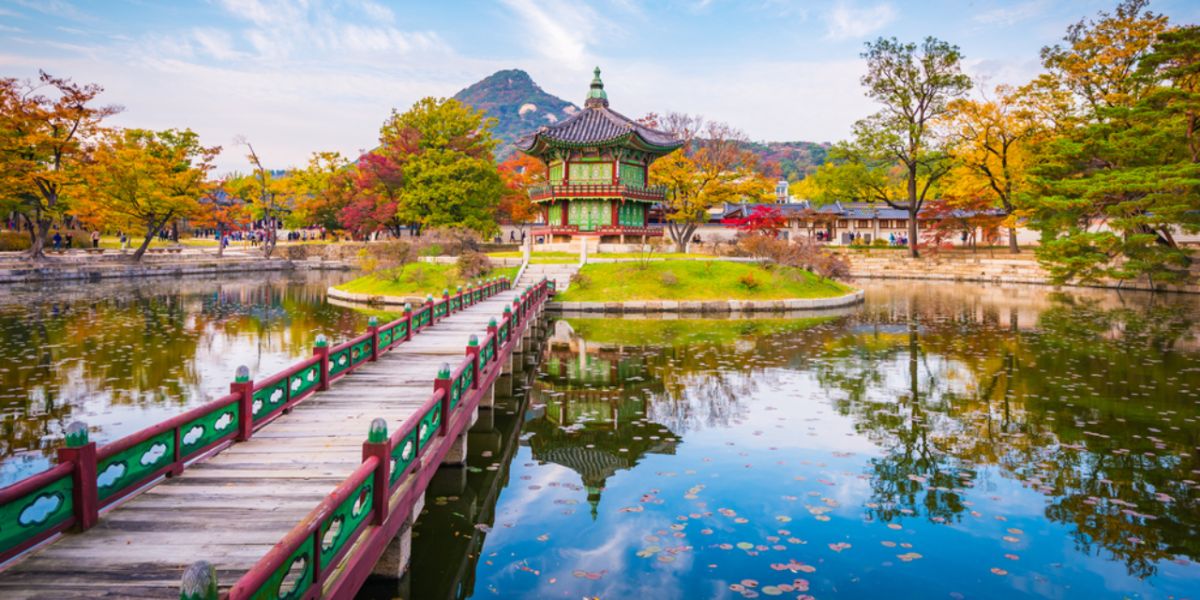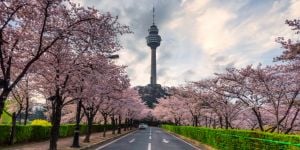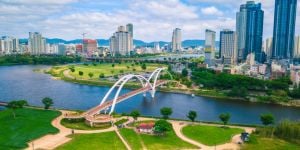
South Korea has been attracting more and more Working Holiday Visa volunteers in recent years. Yes, there are many reasons to visit the homeland of BTS, the mythical Korean pop group (or K Pop): South Korea has a rich and delicious cuisine (think of Kimchi, Korean barbecue, Bibimbap, Bulgogi, among others), beautiful palaces to visit, amazing nature, incredibly modern architecture, stunning beaches as well as unique cafes! Fashion lovers will also be delighted as South Korea is the new trendsetter in fashion.

If you want to move to South Korea to discover the country while working, the Working Holiday Program Visa (WHV) allows you to stay for up to 1 or 2 years (depending on the country). WHV holders will be able to work in a local company, do an internship and even study during their stay.
How to be eligible for the Working Holiday Visa in South Korea?
The application for a Korean working holiday visa is made at the South Korean embassy or consulate in your home country. The following conditions apply:
1. Your nationality
Only passport holders from the following 21 countries are eligible for the WHV in South Korea: Australia, Austria, Belgium, Czech Republic, Canada, France, Denmark, Hong Kong, Germany, Italy, Japan, New Zealand, Portugal, Netherlands, Sweden, Taiwan, United Kingdom, Hungary, United States of America, Israel, Chile and Ireland.
Important:
The WHV should not be confused with the IYE (International Youth Exchange) program.
2. Your age
The Working Holiday Visa is normally granted to people aged between 18 and 30. This means that people aged 30 were allowed to enter South Korea until the evening of their 31st birthday.
But the good news was announced on 15 March 2022! In order not to penalize them (because of the border closures due to the coronavirus crisis), all French applicants who missed their chance to go to South Korea on a WHV will be able to catch up as the maximum age of eligibility will be increased to 32. This agreement will be valid until March 2024!
3. Having a valid passport
As with any other country that has signed a WHV agreement, one of the most important requirements is that you must have a passport that will be valid for a minimum of 12 months after you have obtained your visa.
Please note that if you are coming from Belgium or Canada, your passport must be valid for more than one year — 15 months and 13 months, respectively.
Another essential requirement is that your passport, regardless of nationality, must have at least two blank pages so that the Korean authorities can stamp and visa your entry and exit.
4. Having a health insurance policy
It is strongly recommended that you take out health insurance before you leave for South Korea. Anything can happen at any time, and you don't want to end up with a hefty bill.
Your insurance policy should cover illness, possible hospitalization and repatriation for the entire duration of your stay in South Korea. You will need to provide a certificate from your insurance company when you apply for the WHV. When applying for your insurance, please indicate the date of your departure to South Korea as the effective date.
Good to know:
It is recommended that you have a specific contact at the insurance company in case you need to contact someone about your insurance while you are there.
5. Have sufficient savings/minimum budget
When applying for a visa at the South Korean Embassy, your application must include proof of funds. You will need to demonstrate to the Korean government that you are able to support yourself at the start of your stay in the country.
A minimum of 3,000 USD is required (depending on the country where you come from) — add to this the cost of a return plane ticket to your country (or why not, to your next WHV destination).
Good to know:
While Belgians and French people only need to show a single ticket (and official proof of funds in their bank account to show that they will be able to buy a plane ticket when they leave Korea), Canadians need to show a return ticket.
6. First-time participation
You can participate in the Working Holiday Visa program in South Korea only once. If you have already been on a WHV in South Korea, you will not be able to return on this visa a second time. However, if you have been on a WHV in other countries, you will not have any problems.
7. The quota per country
As with any other WHV, it is important to know that each country only has a limited number of places available each year. But don't worry because there are usually enough places for the quota of participants.
Good to know:
Applicants to the WHV program in South Korea are not allowed to bring dependents with them. If you wish to travel there with more than one person, your accompanying persons must apply separately and meet the above conditions.
8. Validity after visa issuance
After receiving your permit, you will have only one month to travel to South Korea. You are, therefore, advised to be well prepared before applying for your WHV.
Good to know:
Once the visa is granted, the beneficiary is allowed to live and work in South Korea for a maximum of 12 months. They are also allowed to leave the country and return as many times as they wish during their stay without having to apply for an additional work permit. Furthermore, there are no restrictions on the type of jobs that can be done in South Korea.
What are the procedures for obtaining a Working Holiday Visa in South Korea?
To apply for the WHV program in South Korea, the applicant must present:
- Their passport, which must be valid at the time of application and throughout the stay,
- Proof of sufficient funds to cover their expenses during the stay (around 3,000 USD or approximately 3,393,185.98 South Korean Won),
- A passport-size photo,
- Round trip air ticket,
- A medical certificate of good health,
- A clean criminal record,
- A letter of motivation stating why the applicant wishes to visit South Korea,
- A school certificate or diploma
The applicant should bring the visa application in person or send it by mail to the South Korean embassy or consulate in the country of residence. Some nationalities are subject to an application fee, while others are exempt.
To know more about the process, do not hesitate to contact the embassy or general consulate of South Korea of your country. They should be able to give you the precise information that you would need to apply for the work holiday visa.
Things to consider before moving to South Korea on a WHV
1. The cost of living in South Korea
Before you travel to a country, it is essential that you research the cost of living so that you can get an idea of how much you will need to live there. It is good to know that life in South Korea can be more expensive than in Europe (especially when it comes to food and in the big cities such as Seoul) so that you can be prepared for the costs awaiting you there.
The following table will give you an idea of the cost of living in South Korea - (source Numbeo; as of June 2022):
Currency: US Dollars (USD) | |
Rent | |
1-bedroom flat (in the city center) | 482.69 |
1-bedroom flat (outside the city center) | 332.03 |
3-bedroom flat (city center) | 1,126.04 |
3-bedroom flat (outside the city centre) | 789.88 |
Utilities | |
Water, electricity, air conditioning, heating, waste collection for an 85m² apartment | 139.95 |
Internet (60 Mbps or more, ADSL/cable, unlimited data) | 20.90 |
Transportation | |
1 ticket (one way) for local transport | 1.00 |
Monthly pass for local transport | 20.90 |
Shopping/groceries | |
Rice (1 kg) | 3.52 |
Milk (1 L) | 1.98 |
12 eggs (normal size) | 3.01 |
Bread (500 g) | 2.45 |
Chicken (1 kg) | 8.80 |
Red meat (1 kg) | 30.40 |
Oranges (1 kg) | 5.24 |
Bananas (1 kg) | 3.36 |
Apples (1 kg) | 6.21 |
Potatoes (1 kg) | 3.52 |
Onions (1 kg) | 2.59 |
Water (1.5 L) | 1.02 |
Wine (mid-range bottle) | 13.05 |
Local beer (0.5 L) | 2.02 |
Imported beer (0.33 L) | 2.44 |
Cigarettes (pack of 20) | 3.46 |
Leisure | |
Movie theatre - 1 seat | 9.21 |
Sports club - monthly cost for 1 person | 45.42 |
2. Having some basic knowledge of Korean
Going to South Korea obviously involves learning the language of the nation! Although some Koreans speak a little English, you will find it very difficult to communicate and integrate if you do not make an effort to learn Korean.
So here are some useful tips for learning Korean:
Learn Hangul (the Korean alphabet) - when starting to learn a foreign language, you need to have a good command of the alphabet. This will be an excellent starting point on the road to language acquisition. In fact, the Korean alphabet is not as complicated as it seems at first glance compared to other Asian languages.
Build your vocabulary - learn everyday words and phrases that you might use on the bus, in the supermarket, etc.
Take on a Korean teacher - many learning platforms offer to learn a language with the help of a professional. You'll progress much faster with the support of someone who speaks the language fluently.
Download a learning app - Rosetta Stone, Duolingo, and others. You'll have no trouble finding an app that will help you get ahead.
Immerse yourself in the culture - Make friends who speak Korean, listen to Kpop and watch Kdramas! No doubt you'll learn a lot…
3. Finding accommodation in South Korea
Finding accommodation before you land in South Korea will definitely be less stressful than arriving there and having to look for a place to safely rest.
Apps like Dabang and Jikbang will help you view rooms and their prices in specific areas without visiting them. However, these apps do not allow you to rent a room directly. They will give you the contact details of the real estate agent in charge of renting it. Using these apps allows you to get a better idea of the flat you are interested in before you start the rental process in South Korea.
Other platforms, such as Craigslist and Airbnb, are also recommended for your search. For those who want to save money, there are plenty of hostels available throughout South Korea.
4. The means of transportation in South Korea
Are you wondering how you will get around when you are in South Korea? Don't panic! South Korea is one of the most developed and modern countries in terms of public transport. In the major cities, the best option for getting around is certainly the underground. The Seoul underground, for example, is one of the most efficient systems in the world — extremely modern and with information in English everywhere. Buses and ferries are also widely used.
And thanks to Google Maps, you certainly won't get lost along the way!
4. Finding work in South Korea
Research is your best friend — you'll definitely find a job in South Korea through platforms such as PeoplenJob (considered the best job search engine in Korea for foreigners), Seoul Professionals (a decent website with jobs for different levels of experience), or Craigslist (you'll find mainly English teaching positions and part-time work opportunities).
Things to do upon your arrival in South Korea
Within three months of arrival in South Korea, the Working Holiday Visa holder must register with the Immigration Office to receive the Alien Card. Any change of address must be reported to the responsible authorities within 14 days.
Important:
Under the Working Holiday Programme in South Korea, it is not possible to change the status of the visa or to extend your stay.
Useful link:
We do our best to provide accurate and up to date information. However, if you have noticed any inaccuracies in this article, please let us know in the comments section below.








